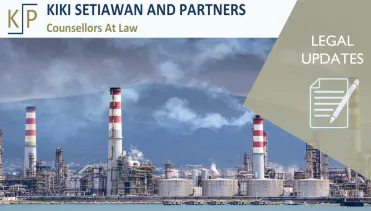
KSP LEGAL UPDATES
Publication
KSP LEGAL UPDATES
Payment and Delivery Methods in Import and Export Transaction


Payment and delivery methods in international trade transaction are essential to be agreed in an international commercial agreement to protect and secure the contracting parties’ interests, to shift potential loss to the relevant bank, to expand market access, to add export value, to protect trading balance, to improve production and so forth.
Based on these benefits, the Government of Indonesia (“GOI”) recently enacted Government Regulation Number 29 of 2017 on Payment and Delivery Methods in Import and Export Transaction (“GR 29/2017”).
The GR 29/2017 stipulates payment method for export in the form of cash, Letter of Credit (L/C), Advance Payment, Open Account, Collection and Consignment. Payment method for strategic and important goods which are limited to be exported or free to be exported should be done via L/C based on Article 6.1 of the GR 29/2017. Meanwhile, payment method for import can also be done via barter, buy back and offset pursuant to Article 6.1 of the GR 29/2017.
L/C, as defined in the GR 29/2017, is a credit notification issued by an opening bank based on importer’s request, which are its customer, and addressed to exporter as beneficiary through advising bank overseas, with request to procure some money to exporter (individual or business entity) whose name is written in such L/C for payment of the goods delivered by exporter.
Delivery of exported goods can be done with Free on Board (FOB), Cost and Freight (CFR), Cost, Insurance and Freight (CIF) or any other delivery of goods methods such as Ex Works (EXW), Free Carrier (FCA), Free Alongside Ship (FAS), Carriage Paid To (CPT), Carriage and Insurance Paid To (CIP), Delivered at Terminal (DAT), Delivered at Place (DAP), and Delivery Duty Paid (DDP).
Delivery of particular exported goods which are strategic and important goods should be done via Cost, Insurance and Freight (CIF) based on Article 8.1 of the GR 29/2017. Meanwhile, the particular imported goods should be carried out via Free on Board (FOB) pursuant to Article 10.1 of the GR 29/2017.
Elucidation of Article 10 of the GR 29/2017 defines the particular imported goods are imported goods to be used by government either ministry, non-ministerial government department, regional government, state owned enterprises or regional owned enterprises. This includes staple food products such as rice, meets, corn etc.
Administrative sanction applies to any violation of Article 4.1, Article 6.1, Article 8.1 and Article 10.1 of the GR 29/2017 in the form of written warning, close-down of work, administrative fines, freezing permit, and/or revocation of permit.
Based on these benefits, the Government of Indonesia (“GOI”) recently enacted Government Regulation Number 29 of 2017 on Payment and Delivery Methods in Import and Export Transaction (“GR 29/2017”).
The GR 29/2017 stipulates payment method for export in the form of cash, Letter of Credit (L/C), Advance Payment, Open Account, Collection and Consignment. Payment method for strategic and important goods which are limited to be exported or free to be exported should be done via L/C based on Article 6.1 of the GR 29/2017. Meanwhile, payment method for import can also be done via barter, buy back and offset pursuant to Article 6.1 of the GR 29/2017.
L/C, as defined in the GR 29/2017, is a credit notification issued by an opening bank based on importer’s request, which are its customer, and addressed to exporter as beneficiary through advising bank overseas, with request to procure some money to exporter (individual or business entity) whose name is written in such L/C for payment of the goods delivered by exporter.
Delivery of exported goods can be done with Free on Board (FOB), Cost and Freight (CFR), Cost, Insurance and Freight (CIF) or any other delivery of goods methods such as Ex Works (EXW), Free Carrier (FCA), Free Alongside Ship (FAS), Carriage Paid To (CPT), Carriage and Insurance Paid To (CIP), Delivered at Terminal (DAT), Delivered at Place (DAP), and Delivery Duty Paid (DDP).
Delivery of particular exported goods which are strategic and important goods should be done via Cost, Insurance and Freight (CIF) based on Article 8.1 of the GR 29/2017. Meanwhile, the particular imported goods should be carried out via Free on Board (FOB) pursuant to Article 10.1 of the GR 29/2017.
Elucidation of Article 10 of the GR 29/2017 defines the particular imported goods are imported goods to be used by government either ministry, non-ministerial government department, regional government, state owned enterprises or regional owned enterprises. This includes staple food products such as rice, meets, corn etc.
Administrative sanction applies to any violation of Article 4.1, Article 6.1, Article 8.1 and Article 10.1 of the GR 29/2017 in the form of written warning, close-down of work, administrative fines, freezing permit, and/or revocation of permit.

Latest KSP LEGAL UPDATES





